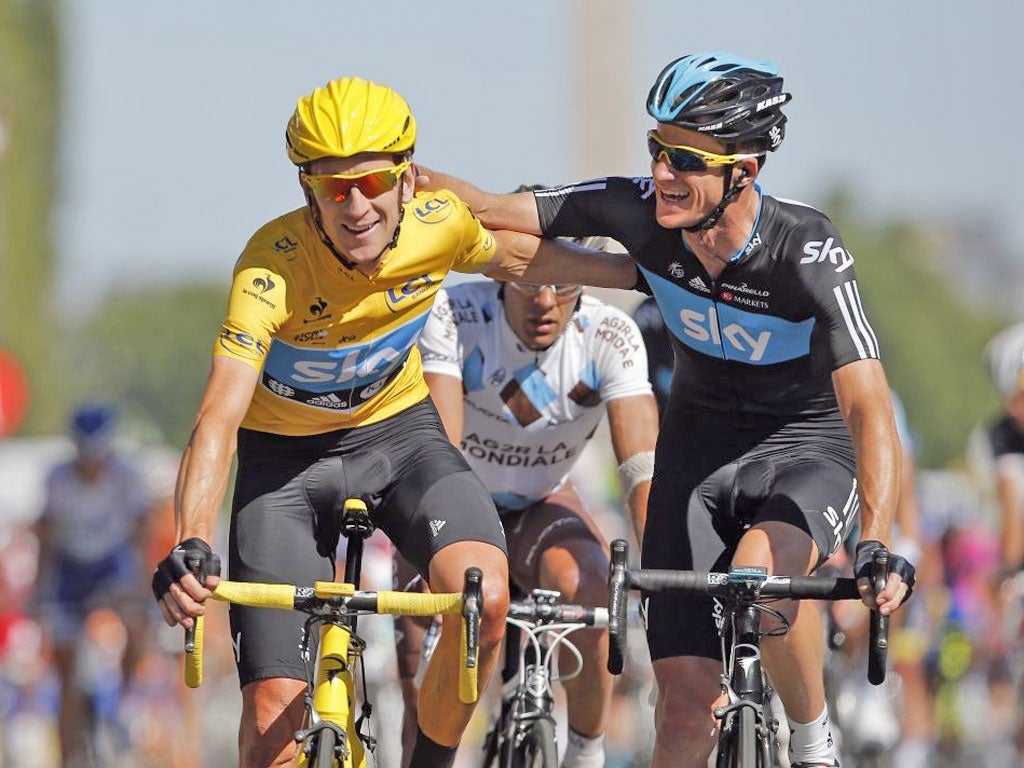James Lawton: Bradley Wiggins takes rightful place with Tour de France greats as no more or less than a first among equals
Winning his prize would have been a fantasy in any other circumstances

Because it is the obsession of the age, and also the scale of the historic achievement Bradley Wiggins yesterday carried down the Champs-Élysées, the question is maybe inevitable.
Is he the greatest of all British sportsmen – has he these last few weeks travelled, with so much versatility and courage, on to terrain all of his own while winning Britain's first yellow jersey in the world's supreme bike race?
No, he isn't and he hasn't and in a better ordered sports culture the question would not even be posed.
It would be enough to say that the 32-year-old son of a pro racer, who has gone so far beyond all traditional expectations with his three gold medals and such serious possibilities in the Olympic road race, has joined the very highest company of his nation's sportsmen and women.
He has gained admittance to the strata which have one basic requirement. It is the proof that you can compete not only at the very highest level of world sport but that you can inflict winning qualities to the point that, at some climactic period of your life, and for however long, you were indeed capable of beating any opposition placed before you.
Wiggins, it is true, has done it with the support of a brilliantly orchestrated team and the superb and selfless backing of a team-mate, Chris Froome, who in a different year, and different circumstances, might have struck out on the most eviscerating climbs for his own place in the sun. This doesn't diminish the feat of Wiggins, of course – the winning of his prize would have been a fantasy in any other circumstances – but it is one caution against the slavish tendency to make the latest triumph the one that permits no serious comparison.
In this case it is – even with the image of the great boulevard of the City of Light en fête, and with a son of Kilburn at its heart, so fresh – a little difficult to relegate some of the great cyclist's rivals to the minor places.
Who, in their wildest enthusiasm for the moment, would do that to Sir Roger Bannister, the man who on a chilly night in Oxford, not only broke the four-minute mile barrier and fell into the waiting arms spent, quite utterly, but also smashed a huge psychological barrier?
Nearly 60 years ago, Bannister achieved a huge historic landmark in the history of one of the most basic of sports, and next week, after a brilliant medical career, he will take his place among the Olympic throngs, as convinced, and as representative, of the value of sport as he was as a young student.
As the band played for Wiggins in Paris, were other great British sportsmen being similarly downscaled in the broad sweep of the nation's history?
It was a possibility hard to dismiss in the first rush of acclaim for Wiggins and, if it indeed happened, who else was being asked to move over?
Was Lord Coe also downgraded despite his two Olympic golds in the 1500 metres of Moscow and Los Angeles – and an 800 metres world record that lasted a phenomenal 16 years? And what of Sir Steven Redgrave – five Olympics, five golds – or the Welsh half-backs Gareth Edwards and Barry John or the Irish footballer George Best, whose life may have contained much folly but whose game carried so many admirers on to another dimension?
The trick, in all of this, is to give all the great men their own place in the annals of the nation's sport and if we do this there will be no fear about the marginalisation of Bradley Wiggins, neither now nor perhaps when he is called to the Palace in the footsteps of his Olympic team-mate Sir Chris Hoy.
Wiggins' performance over the last few weeks is hardly in need of exaggerated reaction – just an implicit understanding of quite what was asked of him. Lance Armstrong, the serial Tour de France winner whose immersion in drug controversy has contributed to a legacy of doubt which is still guaranteed to draw the anger of Wiggins, provided his own burning analysis of quite what is involved. "Riding the tour," said the man who, along with the yellow jerseys, also had a victory over cancer, "demands stamina not unlike that of those who are ill every day."
Hennie Kuiper, a fine Dutch rider, once recalled the effects of one of the crueller climbs in the Pyrenees. "The snow on the peaks turned black in my eyes," he declared.
Having negotiated such trials, Bradley Wiggins may consider the pitfalls of sudden and huge celebrity relatively hazardless. Certainly, he is unlikely to crave any greater accolade than the one that came to him yesterday. This is because he is a professional cyclist, one of the great ones, and no one needs to tell him the meaning of what he has done.
Subscribe to Independent Premium to bookmark this article
Want to bookmark your favourite articles and stories to read or reference later? Start your Independent Premium subscription today.

Join our commenting forum
Join thought-provoking conversations, follow other Independent readers and see their replies